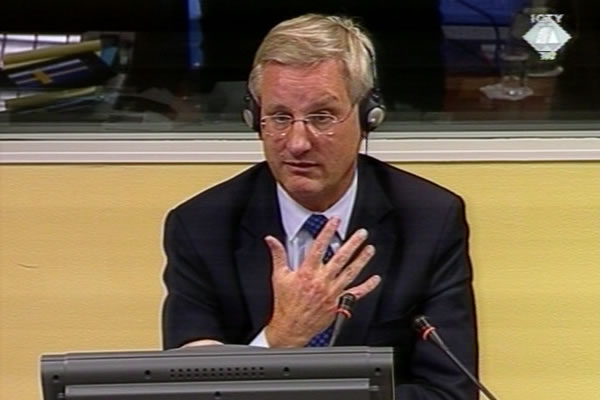Home
CARL BILDT: MLADIC WAS ‘FEUDAL LORD FROM A DARK WORLD’
Swedish foreign minister Carl Bildt, former co-chairman of the peace conference for the former Yugoslavia, testified at the trial of General Momcilo Perisic on his meetings with Slobodan Milosevic and Ratko Mladic in July 1995. Mladic treated his men as a ‘medieval feudal lord living in a dark world for whom all modern concepts were foreign’
 Carl Bildt, witness at the Momcilo Perisic trial
Carl Bildt, witness at the Momcilo Perisic trial The trial of former chief of the VJ General Staff Momcilo Perisic continued today with the evidence of Swedish foreign minister Carl Bildt. Bildt, former co-chairman of the peace conference for the Former Yugoslavia, described his meetings with Slobodan Milosevic and Ratko Mladic in July 1995. Perisic didn’t attend those meetings. Bildt explained he had ‘no direct or indirect knowledge’ about the accused during the war in Bosnia.
At the beginning of his evidence Bildt recounted his meeting with Slobodan Milosevic on 7 July 1995; Bildt had requested the meeting to get in contact with Ratko Mladic. After NATO air strikes on Pale in May 1995, the communications between UNPROFOR and the VRS were severed. Bildt felt it was necessary to establish contact with Mladic in order to ‘deal with the issues regarding the enclaves’. Mladic talked about his men as if he were ‘a medieval feudal lord living in a dark world, for whom all modern concepts were foreign’, the witness described. He wanted a ceasefire because he held 70 percent of the territory and wanted to have direct contact with the BH Army command. According to Bildt, Republika Srpska ‘suffered because of the blockade on the Drina River’ and had problems securing its long front line; Mladic was ‘trying to get recruits from the FRY’ to deal with those problems.
After the fall of Srebrenica on 11 July 1995, Bildt met with the BH ambassador to the UN, Muhamed Sacirbegovic, who testified about the meeting before the Tribunal last year. As Sacirbej claimed, Bildt told him that the ‘UN will not defend Srebrenica, Zepa and Gorazde’ and refused to green-light air strikes. Bildt contends that ‘by then Srebrenica had already fallen and I couldn’t have made such a comment’, adding that he ‘had no airplanes and was not a part of the military chain of command’. Bildt denied that he was in talks to ‘swap the enclaves in eastern Bosnia for Sarajevo’.
After Srebrenica fell, Bildt met with Milosevic again, on 14 July 1995. Bildt confirmed that a ‘preliminary agreement between generals Rupert Smith and Mladic’ was made that day; it was to be ratified later. The agreement was about ‘urgent access to Srebrenica and the enclaves’.
Bildt contends that he learned about mass executions of boys and men from Srebrenica on 20 July 1995 from ‘the women leaving the enclave’. What had happened in Srebrenica was a ‘big surprise’ for him but Bildt said that he had ‘couldn’t say if the massacre could have been foreseen’.
In the cross-examination, the prosecutor suggested that ‘the cleansing of the enclaves could have been anticipated’ after the Serb forces entered Srebrenica. Bildt agreed. When the army took over the enclave, ‘it could be assumed that there would be killings out of retaliation, revenge or something else’, said Bildt.
The trial of General Perisic continues on 4 November 2010. General Perisic is charged with providing personnel, financial and logistic support to the Serb armies in Bosnia and Croatia. He thus contributed to their crimes in Sarajevo, Zagreb and Srebrenica, the prosecution alleges.
Linked Reports
- Case : Perisic
- 2010-10-01 A BILLION DOLLAR FOR WARS IN WHICH SERBIA DIDN’T PARTICIPATE
- 2010-09-23 VJ INTELLIGENCE OFFICERS IN SREBRENICA
- 2010-09-20 ‘NEGATIVE EXPERIENCE’ WITH GENERAL MLADIC
- 2010-11-04 WHO ARMED THE BOSNIAN SERB ARMY
- 2010-11-05 PROSECUTOR: EXPERT REPORT BASED ON INACCURATE DATA
- 2011-01-11 GENERAL PERISIC’S DEFENSE RESTS ITS CASE
